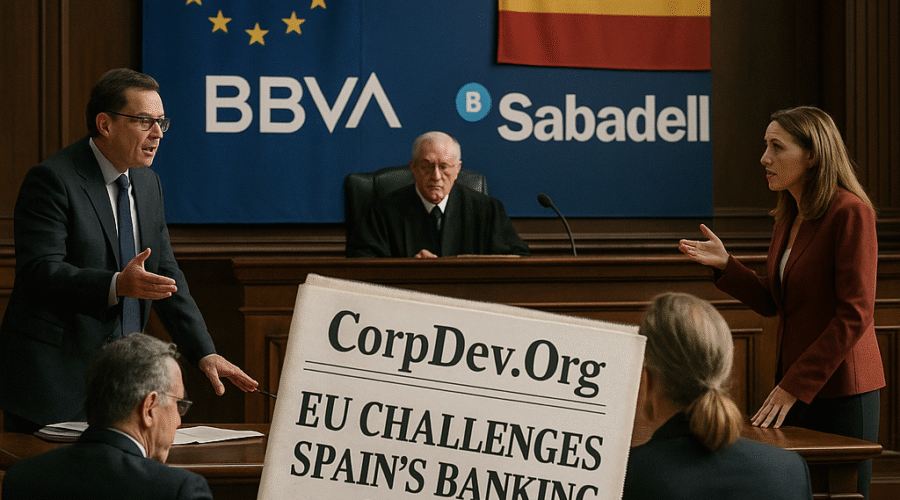The European Commission has initiated infringement proceedings against Spain over its imposition of restrictive conditions on BBVA’s €12 billion takeover of Banco Sabadell, marking a pivotal confrontation between national sovereignty and EU single market principles. This unprecedented legal action challenges Spain’s requirement that the banks maintain separate legal identities for three to five years post-acquisition—a condition the Commission argues violates capital movement freedoms under Articles 63-66 of the Treaty on the Functioning of the European Union[10][14][15]. The clash emerges as Spain defends its intervention as necessary to protect territorial cohesion and employment, while EU authorities contend such national obstacles undermine banking union progress and contradict ECB and competition authority approvals already granted for the merger[5][13]. This conflict represents a critical test case for cross-border banking consolidation in Europe, with implications for €2.3 trillion in banking assets across the eurozone.
💼 M&A / PE diligence in 24 hours? Yes, thanks to AI!
Anatomy of the Contested Merger
BBVA’s Hostile Takeover Strategy
BBVA launched its unsolicited all-share offer for Sabadell in May 2024, marking its second attempt after a failed 2020 bid. The acquisition aimed to create Spain’s second-largest lender with combined assets exceeding €1 trillion, leveraging Sabadell’s strong domestic SME lending network alongside BBVA’s emerging markets footprint[2][4]. The hostile approach bypassed Sabadell management’s rejection by taking the offer directly to shareholders, triggering immediate political backlash from Spain’s coalition government concerned about Catalonia-focused operations[9][12]. Market volatility saw the offer value fluctuate between €11-12 billion as share prices reacted to regulatory developments, ultimately leading Spain’s CNMV to suspend trading in both banks pending government resolution[4][13].
Regulatory Pathway and Approvals
The European Central Bank’s Banking Supervision division granted prudential approval in September 2024, concluding the merged entity would maintain “sufficient capital, liquidity and good governance” despite concerns about market concentration[1][5]. Spain’s National Commission on Markets and Competition (CNMC) followed in May 2025 with conditional clearance requiring BBVA to maintain certain branches and commercial terms for SME customers[2][11]. Notably, ECB officials emphasized their neutral stance toward consolidation, with supervisory board member Margarita Delgado stating: “We assess mergers strictly through a prudential lens—viable business models and resolvability are our only concerns”[5]. This established regulatory framework would soon collide with Spain’s extraordinary political intervention.
Spain’s Unprecedented Intervention
The Three-Year Separation Mandate
On June 24, 2025, Spain’s Council of Ministers approved the takeover under extraordinary conditions requiring BBVA and Sabadell to operate as legally distinct entities for at least three years, extendable to five. The decree mandates complete operational autonomy in lending practices, HR policies, branch networks, and foundation activities—effectively blocking workforce integration, branch consolidation, and technological synergies[2][4][12]. Economy Minister Carlos Cuerpo justified these measures under Article 9 of Spain’s Competition Law (15/2007), citing protection of “territorial cohesion, employment stability, and SME financing” as overriding public interest concerns beyond competition policy[11][12]. This marked the first application of such extensive Phase III conditions since Spain’s 2012 Antena 3-La Sexta media merger.
Political Context and National Interests
The intervention reflects Spain’s fragile political landscape, where the minority coalition government faces pressure from Catalan parties and labor unions fearing Sabadell’s absorption would diminish regional influence. Sumar, the junior coalition partner, explicitly demanded “layoff prohibitions and branch closure bans” as prerequisites for support[12][14]. Minister Cuerpo emphasized the “technical, not political” nature of the decision, though internal documents reveal concerns about Sabadell’s 2,100 Catalan branches and its foundation’s €50 million annual social investment[9][12]. The government’s own impact assessment warned that without separation mandates, the merger could trigger 3,800 job losses and reduce SME lending by 15% in vulnerable regions[7][12].
EU’s Legal Challenge
Infringement Proceedings Framework
The European Commission’s Directorate-General for Financial Stability (FISMA) initiated formal infringement proceedings on July 17, 2025, arguing Spain’s conditions violate EU capital movement freedoms. The case rests on two pillars: first, that Spain’s Competition Law provisions enabling ministerial override conflict with the ECB’s exclusive prudential supervision mandate under the Single Supervisory Mechanism[10][15]; second, that the three-year separation requirement constitutes a “disproportionate restriction” on free movement of capital under CJEU precedent[11][14]. Commission Vice President Valdis Dombrovskis stated: “National measures must be exceptional and precisely targeted—blanket operational separation fundamentally undermines the single market’s core principles”[13][15].
Procedural Timeline and Potential Sanctions
Spain now faces a two-month deadline to respond to the Commission’s formal notice, after which FISMA may issue a reasoned opinion demanding legislative changes. Failure to comply could trigger European Court of Justice proceedings with potential fines reaching 0.1% of Spain’s GDP under Article 260 TFEU[14][15]. Historical precedent suggests accelerated proceedings: when Germany blocked Deutsche Börse’s NYSE merger in 2011, infringement procedures concluded within 14 months. EU sources indicate this case could reach the CJEU by Q2 2026, coinciding with Spain’s next general election cycle[10][14]. The Commission simultaneously investigates Italy’s similar intervention in UniCredit’s Banco BPM acquisition, signaling broader enforcement against banking protectionism[13][16].
Stakeholder Reactions and Market Impact
Bank Responses and Strategic Dilemmas
BBVA confronts an existential decision: proceed with acquisition under value-destructive conditions or abandon its largest strategic move in a decade. CEO Carlos Torres publicly acknowledged considering “all legal avenues,” including Supreme Court appeals against the government’s authority to impose conditions beyond CNMC’s mandate[9][12]. Internal analyses suggest the separation rules would erase €770 million in projected cost synergies and delay technological integration by 48 months[6][9]. Sabadell CEO César González-Bueno conceded the deal’s “feasibility has fundamentally changed,” with the bank’s minority shareholders association declaring the offer “non-viable” due to adverse tax implications for retail investors[9].
Broader Market Consequences
European banking stocks reacted negatively to Spain’s intervention, with the EURO STOXX Banks Index falling 2.3% on announcement day. Credit default swaps for Spanish bank debt widened by 15 basis points, reflecting investor concerns about regulatory uncertainty[4][13]. Analysts at Goldman Sachs noted the case creates “material precedent risk” for pending mergers including BNP Paribas’ potential bid for Commerzbank, where similar political obstacles could emerge[13][16]. Private equity firms have paused €8 billion in financial sector investments pending the case’s outcome, with KKR and CVC reassessing southern European banking targets amid regulatory uncertainty[13].
Systemic Implications for European Banking
Banking Union Fragmentation Risks
The conflict exposes critical flaws in Europe’s banking union architecture, where incomplete deposit insurance schemes and resolution frameworks perpetuate national ring-fencing. ECB supervisory board member José Manuel Campa warned: “Banks remain reluctant to cross borders because deposit liabilities remain nationally segregated—this case demonstrates the urgent need for EDIS”[3][5]. Data reveals only 18% of eurozone banks operate across multiple member states, compared to 67% of US regional banks operating interstate. The BBVA-Sabadell impasse may delay critical CMU legislation, including proposals for harmonized insolvency procedures and equity market reforms scheduled for 2026[3][5].
Competitiveness Concerns
EU financial stability reports indicate European banks operate at 40% lower cost efficiency than US peers, with return on equity trailing by 380 basis points. Banking consolidation represents the Commission’s primary strategy to close this gap, targeting €22 billion in annual efficiency gains through cross-border mergers[13][16]. Spanish intervention undermines this policy, potentially preserving 15 redundant banking entities in markets like Italy and Germany where similar deals await precedent[16]. ECB modeling suggests delayed consolidation could cost the eurozone 0.6% in potential GDP growth by 2030 due to persistent credit fragmentation[1][5].
Legal and Regulatory Analysis
Competing Legal Frameworks
The case presents a collision between Spain’s Competition Law Article 9—permitting ministerial intervention for “general interest” objectives—and EU Treaty Articles 63-66 guaranteeing free capital movement. Legal scholars note Spain’s invocation of “territorial cohesion” and “social policy” mirrors CJEU case law (C-42/07 Liga Portuguesa) allowing restrictions only when “proportionate and non-discriminatory”[11][14]. However, the Commission contends a five-year operational separation constitutes de facto prohibition, violating the principle of proportionality established in C-384/93 Alpine Investments[10][15]. Spanish constitutional experts counter that the 2007 law implements EU Merger Control Regulation Article 21(4), creating legal ambiguity the CJEU must resolve.
ECB’s Prudential Supremacy Question
At the core of the dispute lies unresolved tension between the ECB’s exclusive competence over banking stability and national governments’ right to define public interest. The ECB’s September 2024 approval explicitly addressed financial stability concerns, finding no material risks to resolvability or depositor protection[1][5]. Spain’s subsequent intervention implicitly challenges this assessment, asserting superior authority over “social dimensions” of banking operations. Legal analysts suggest this could prompt Treaty revisions clarifying Article 127(6) TFEU to explicitly subordinate national interventions to ECB prudential determinations[11][15].
Potential Resolutions and Industry Impact
Negotiated Settlement Scenarios
Behind closed doors, Commission and Spanish officials explore compromise solutions including reducing the separation period to 18 months with binding job guarantees. BBVA has proposed alternative commitments: maintaining Sabadell’s brand for retail operations, guaranteeing SME lending volumes, and establishing a €300 million regional development fund[9][12]. The most probable outcome involves Spain accepting modified conditions before the Commission’s two-month deadline, avoiding CJEU escalation. Historical precedent exists: Germany revised its Deutsche Börse veto after Commission pressure in 2012, though Spain’s coalition dynamics complicate similar retreats[10][14].
Broader Sector Consequences
Regardless of outcome, the case will reshape European banking consolidation. Institutions now face heightened political risk assessments in M&A planning, with due diligence periods extending 30% to evaluate potential government interventions. Lawyers predict proliferation of ”
Sources
https://www.ecb.europa.eu/press/inter/date/2024/html/ecb.in240506~3097f77978.en.html, https://www.bankingexchange.com/news-feed/item/10344-spain-blocks-bbva-sabadell-merger-for-at-least-three-years, https://www.eba.europa.eu/publications-and-media/interviews/jose-manuel-campas-interview-la-razon-banking-adjustment-set, https://www.morningstar.com/news/dow-jones/202506243500/spain-blocks-full-bbva-sabadell-merger-for-up-to-five-years, https://www.bankingsupervision.europa.eu/press/interviews/date/2024/html/ssm.in240605~f059c4f5ec.en.html, https://content.next.westlaw.com/Document/Ib022bc20510811f0a0d8cf4710f90abc/View/FullText.html?transitionType=Default&contextData=%28sc.Default%29, https://www.eurofound.europa.eu/system/files/2022-09/wpef22037.pdf, https://www.retailbankerinternational.com/news/eu-cautions-spain-bbva-sabadell-bid/, https://www.catalannews.com/business/item/bbva-weighs-withdrawing-banc-sabadell-takeover-or-suing-spanish-government, https://thecorner.eu/news-spain/ec-finalising-infringement-proceedings-against-spain-for-additional-conditions-imposed-by-government-on-bbvas-sabadell-takeover-bid/121126/, https://www.addleshawgoddard.com/en/insights/insights-briefings/2025/competition/bbva-sabadell-case-government-oversight-spanish-merger-control/, https://thediplomatinspain.com/en/2025/06/24/the-government-accepts-bbvas-takeover-bid-for-sabadell-if-legal-separation-is-maintained-for-three-years/, https://www.marketscreener.com/quote/stock/BBVA-69719/news/EU-warns-Spain-s-government-not-to-hinder-BBVA-s-bid-for-Sabadell-50091368/, https://www.eldiario.es/economia/bruselas-expedienta-espana-normas-permitieron-gobierno-entorpecer-fusion-bbva-sabadell_1_12470976.html, https://www.lavanguardia.com/economia/20250717/10897537/bruselas-opa-bbva-sabadell-infraccion-procedimiento-espana.html, https://www.politico.eu/article/eu-commission-spain-italy-banking-mergers-competitiveness/





